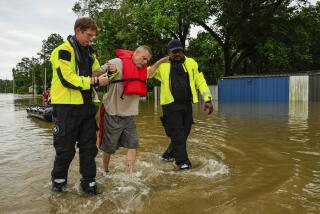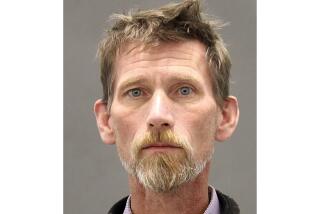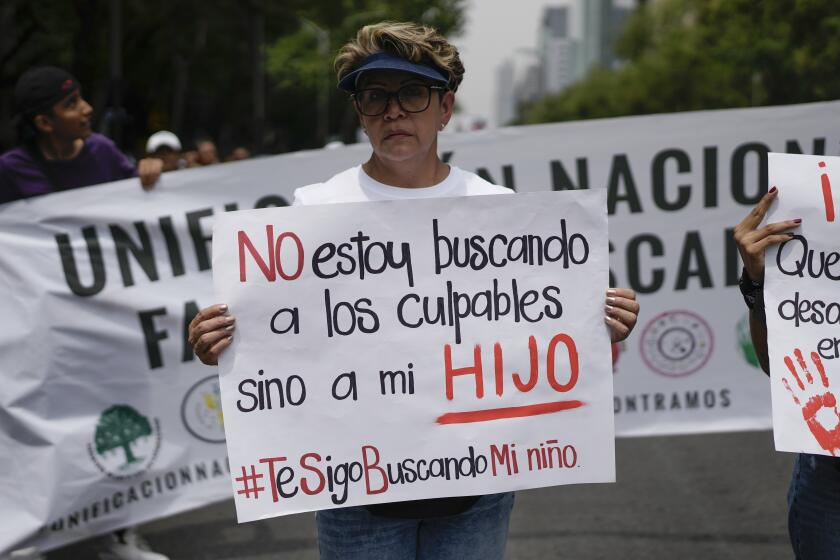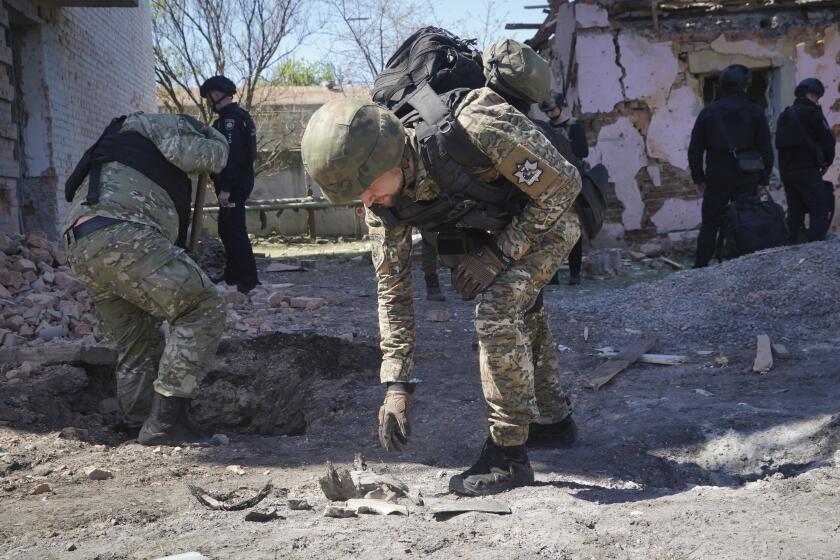U.S. Is Taking a New Tack in Guatemala : Diplomacy: American officials are turning to the military to help achieve stability and to gain help in the war on drugs.
The United States, said to be disillusioned because of persistent corruption in the government of President Vinicio Cerezo Arevalo, is reportedly turning to Guatemala’s military to promote economic and political stability in this country.
According to diplomatic and government sources, Washington has chosen this course even though the military is blamed for human rights abuses and is believed to be involved in drug trafficking.
The goal, a U.S. official said, is to “strengthen other organs of government” to offset corruption in the Cerezo administration.
Earlier this spring, $2 million in U.S. aid intended for fighting a measles epidemic disappeared, U.S. officials said. Cerezo defended the government department that controlled the money and criticized the United States when it suspended the aid program.
It was this incident, together with Cerezo’s failure in his state-of-the-nation address to acknowledge Washington’s $130-million economic aid program for Guatemala, that has turned the Americans to the military.
“There is no doubt that the Americans are so fed up with Cerezo and so concerned about (Cerezo colleague and possible successor Alfonso) Cabrera that they are turning to the military as the only institution capable of keeping this place from becoming another Panama,” said a European diplomat with close contacts to both the United States and the Guatemalan military.
He was referring to Panama’s ousted strongman, Gen. Manuel A. Noriega, who has been charged with taking millions in bribes to abet the drug trade in his country. It is an apt analogy, because Cerezo is suspected of protecting drug-trafficking friends and associates, and Cabrera, who is running for president in next November’s elections, is said by U.S. officials to be a major narcotics figure.
The United States is also concerned about the opposition parties. The U.S. Embassy is backing Jorge Carpio Nicolle, the candidate of the Union of the National Center, but embassy officials say he has the potential to be even more corrupt than Cerezo and his Christian Democrats.
As in Panama, where Noriega was once a paid CIA informant, sources here say that U.S. agencies are making payments to Guatemalan military officers, particularly in army intelligence, known as the G-2. The payments are reportedly in exchange for information on regional as well as local matters, notably the activities of Nicaragua’s Sandinistas and the leftist guerrillas operating in neighboring El Salvador.
G-2 officers are also being paid, it is said, for their cooperation in combatting drug traffickers’ use of Guatemala as a transshipment point for cocaine en route to the United States, and in discouraging the growing of opium poppies in this country.
No one will say for the record how much money is involved, or name the officers receiving the payments. But the payments, reportedly in the thousands of dollars, are said to go to relatively high-ranking officers.
Drug experts deny that the money comes from the U.S. Drug Enforcement Administration. Other sources point to the CIA as the source of the money. They say the CIA has challenged the DEA for control of the war on drugs here.
“What happened is that the CIA first opposed the use of G-2 in the drug war for fear that they would be corrupted, and because the CIA would lose control,” one official said. “Now the agency is trying to take over the drug war and is using the G-2 as leverage.”
Whatever the source of the money and the motive for paying it out, the United States appears to be increasingly willing to overlook otherwise objectionable behavior by the military, especially the G-2, in the field of human rights.
One drug expert said he is convinced that the G-2 unit that has provided cooperation “is clean as a whistle.”
“Others may be dirty,” he said, “but the small elite unit that works with the United States is absolutely clean.”
The question of G-2’s role in alleged human rights abuses is never brought up by U.S. drug experts, he added, because the military’s role is so crucial in the drug war.
The DEA “couldn’t have done 5% (of what it has accomplished here) without G-2’s help,” he said, adding that “as long as they keep doing good work, you don’t ask” about involvement in the killings and disappearances so often attributed to them.
The man the United States looks to for maintaining Guatemala’s support of its anti-drug campaign is Gen. Hector Alejandro Gromajo, the armed forces chief of staff and minister of defense. Gromajo was a senior commander in the early 1980s, when the Guatemalan military was blamed for the deaths of tens of thousands of people, largely civilians, in a campaign against leftist guerrillas and their suspected supporters. But he is seen as a moderate by the U.S. Embassy.
With Cerezo a weak civilian president, Gromajo has defeated at least two officer-led coup attempts against the government.
“Gromajo, even though he really runs the country through the military, has become the Americans’ strongest hope for maintaining a civilian government,” a European diplomat said. “At the same time, he is heavily indebted to the Americans for their support, and you can read that any way you want.”
Washington’s tolerance of Gromajo, or its need for him, evidently outweighs its repugnance at Latin America’s highest level of human rights violations by government security forces or their allies. So-called death squads are blamed for the killings or disappearances of more than 50 people a month.
“I don’t think Gromajo is promoting all these killings,” a Western diplomat said, “but whenever he senses that the left is trying to organize, he permits, if not orders, hard action against them. He certainly doesn’t root out any offenders.”
Since death squads became a military tool in fighting leftist rebels in the 1960s, only one officer of the armed services has been prosecuted for human rights violations.
When the State Department recently attacked Guatemala’s human rights record and recalled Ambassador Thomas Stroock to protest the lack of progress in solving several prominent cases, the focus of the criticism was not on the military but on the civilian administration and Cerezo himself.
If the Americans are turning their back on human rights violations by the military as the price for cooperation in fighting drugs and maintaining an elected government, the arrangement does not always seem to be worth the price.
Gromajo said in a recent interview that he is “committed to a peaceful transfer of power to an elected government” next year, but he acknowledged that many other officers would try to overthrow a Cabrera-led government.
In any case, Gromajo will leave office in June, and he has said he intends to attend Harvard University’s Kennedy School of Government in the fall.
“The general will not have any troops at his command,” a Western diplomat said. “He won’t even be in the country” for the elections or any attempted coup that might follow.
Another diplomat said that if Cabrera wins “there will be a coup the day he takes office; he won’t last a day.”
The objection to Cabrera by military officers is on two levels.
First, it was not long ago that the army outlawed his Christian Democratic Party and considered him to be a “subversive.” Second, he has allied himself with some officers outside the mainstream of the armed forces--largely in connection with the drug business, say some sources--and he has angered powerful army leaders.
The U.S. Embassy has made no secret of its effort to discredit Cabrera and has undertaken a campaign to spread word of his suspected involvement with drugs.
There are strong indications that some powerful military figures are also tainted by the drug trade, including some in G-2.
Lt. Fernando Minera, who was arrested at the instigation of U.S. drug experts for trying to smuggle cocaine into the United States, charged that G-2 officers were engaged in the same activity. And he said the smuggling ring included the immigration service, which is controlled by the military.
A U.S. drug expert acknowledged that “90% of what Minera says is true” regarding the smuggling, but that he is trying to shift the blame from the immigration service to G-2.
Other officials concede that some military personnel, including some in G-2, have been corrupted by the enormous amounts of money involved in drugs, but insist that the armed forces are largely clean.
Besides, they say, it is all relative; what is far more worrisome is the corruption by the Cerezo administration.
More to Read
Start your day right
Sign up for Essential California for news, features and recommendations from the L.A. Times and beyond in your inbox six days a week.
You may occasionally receive promotional content from the Los Angeles Times.






